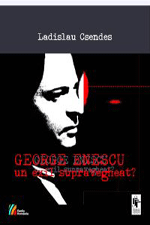> [Archived] Books about music

George Enescu - a Monitored Exile?
Definitely monitored
While the book's title ends with a question mark, after reading the book written by Ladislau Csendes, a well respected musician, lecturer at the National Music University of Bucharest and former president of the NCSSA (National Council for the Studying of Security Archives), I dare say that Enescu's exile was definitely monitored.
Besides, there was little light shed on what happened to George Enescu after he left Romania in 1946, which was expected of the books printed during the communist era, as Enescu's exile was a stain on the reputation of the authorities - a taboo, the present book being the first one after 1989 which can be assigned to the category of musicology to tackle a topic that is so sensitive at the moment.
I actually believe it is fairly clear that it was impossible for Enescu not to have been monitored by the Secret Services. In the end, which of the renowned Romanians who left the country was not monitored by the Secret Services?
Enescu and the prestige of the communist regime
Imagining Enescu as someone prized by the communist authorities as a valuable cultural symbol, an extraordinarily gifted musician would be a mistake. Ladislau Csendes has discovered over 50 documents in the NCSSA - files, letters, papers, notifications - which show that Enescu was only appreciated because his potential return to the country would have increased the prestige of the government in Bucharest at the time. And do not think that he was not promised the moon, as they say, in order to return: from recognition to income and even the possibility of recovering some of his confiscated possessions in Romania. In the meantime, Enescu's niece, Maria Ioana Cantacuzino, who currently goes under the name of Oana Orlea - a teenager at the time - was being held in a communist prison. Besides, when Enescu's star started fading - he had become ill, paralysed and had lost his artistic stamina - the authorities in Bucharest considered that his return would no longer deliver the desired effect and stopped pressuring him.
On the other hand, we are informed that Enescu was not on very good terms with the Romanian diaspora fighting against the leaders in Bucharest, as he had requested and received a passport from the People's Republic of Romania and had not contributed, at least not overtly, to the actions against the regime in Romania.
The NCSSA documents brought to light by Ladislau Csendes show that practically all of the Romanian exiles in Enescu's entourage, with the exception of his wife, was in some way connected to the Secret Services in Bucharest, as they had either been approached by the Secret Services, without making any commitments or were actually spying for them.
Nevertheless, his only concern was music
Given the circumstances, one can only imagine in what conditions Enescu passed away - alienated, dragged into disputes regarding copyright and its transfer to an heir after his death, next to a wife who must have had difficulties adjusting to the poverty of life in exile, surrounded by people about to profit from his death, whether they desired to or not. However, even in such conditions, Enescu's only concern was music. He was a person who stood his ground, as few people manage to do today.
I hope I have excited your interest in reading George Enescu- a Monitored Exile? - in my opinion the most important book on music published in Romania in the last few years. Especially as the book comes with a disc with recordings of some of the works Enescu composed while in exile: the symphonic poem Vox maris, a concert overture op.32 with Romanian folklore themes, Quartet op.22 nr.2 and the Chamber Symphony op.33.
Translated by Roxana-Andreea Dragu
MTTLC, Bucharest University














